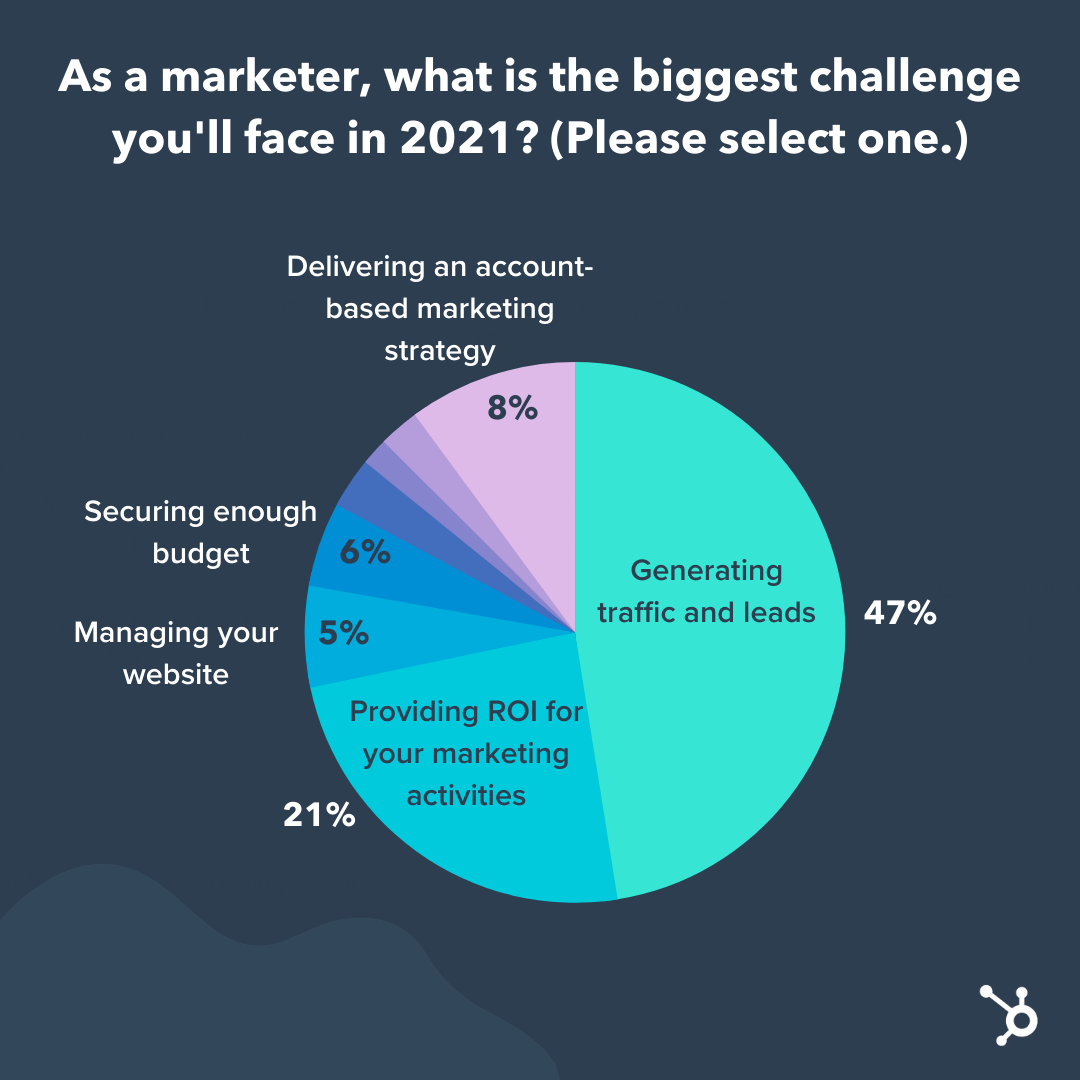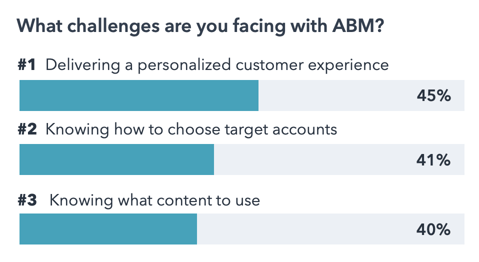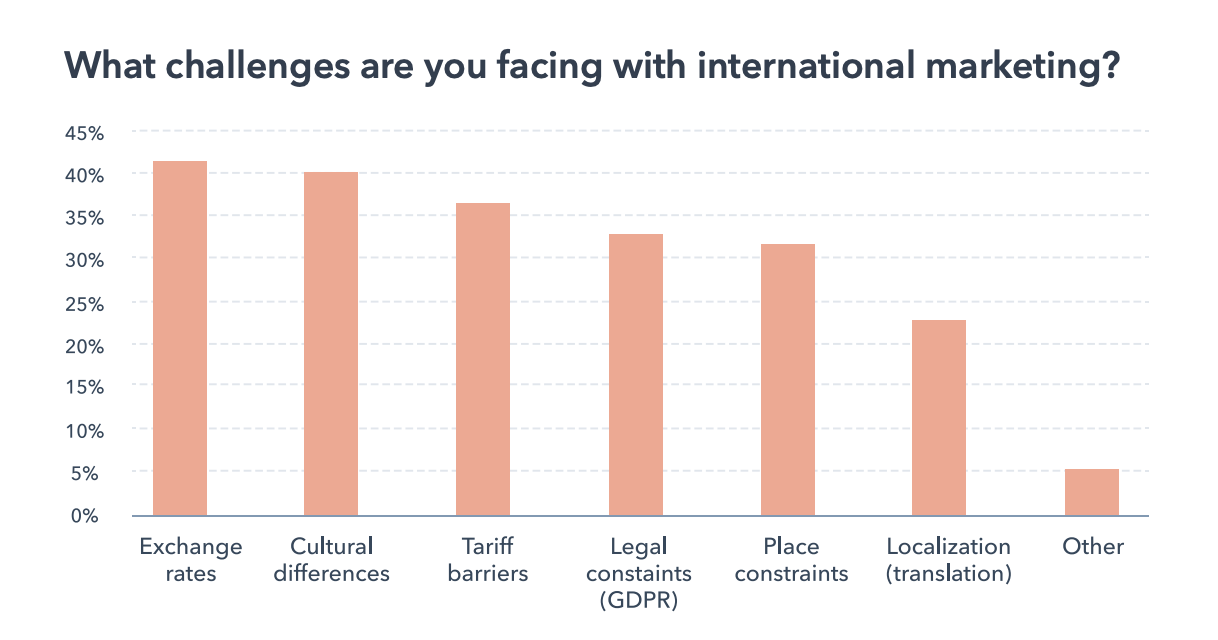Every marketer faces different challenges. Although we typically share similar goals, some teams are stuck on hiring top talent, while others are having trouble finding the right technology for their needs.
Whatever the case may be, there's always at least one area you can improve to turn your marketing into an even more effective revenue generator.
But marketing is often fast-paced, so it can be difficult to identify which areas you'll want to develop to facilitate stronger growth in 2021 and beyond. For that reason, it's important to pause for a moment and reflect on the biggest challenges marketers feel they're going to face this year.
Why? Because problems are much easier to tackle once you've correctly identified them.
So ... what's happening in 2021?
Below, let's review the current global marketing issues impacting the industry, according to marketing experts.
Biggest Marketing Challenges [New Data]
To start, I surveyed over 120 marketers to gauge the biggest challenges affecting the industry as a whole.
 By far, "Generating traffic and leads" was marked by nearly half as the biggest challenge marketers are facing this year.
By far, "Generating traffic and leads" was marked by nearly half as the biggest challenge marketers are facing this year.
This challenge was followed by 21% who said "providing ROI for your marketing activities" was their biggest challenge.
"Delivering an account-based marketing strategy" (8%), "securing enough budget" (6%), and "managing your website" (5%) were the other three notable challenges marketers feel they're facing in 2021.
It's important to note, a few other marketers marked "targeting content for an international audience", "training your team", and "hiring top talent" as their top challenge ... but these three challenges were marked by less than 3% of the respondent pool, so they're less statistically significant.
Let's dive into these in more detail, along with expert tips to combat these challenges, next.
1. Generating Traffic and Leads
Generating enough traffic and leads is the top global marketing challenge in 2021, according to the data mentioned above.
HubSpot's new State of Marketing report supports this — in fact, "Generating more leads" is the top priority of marketers in 2021.
Why It's a Challenge
John Lee, Head of Evangelism at Microsoft Advertising, believes that generating leads will be a particularly big challenge for marketers in 2021. He told me, "Getting quality traffic isn't a challenge today, and likely won't be tomorrow. There has been growth in search and content marketing in 2021. New channels continue to surface and show promise, too (TikTok or audio chat rooms anyone?)."
"Through the 2nd half of 2021 and beyond, the challenges will lie elsewhere – maintain and growing leads or sales, tracking and scaling, etc."
Lee adds, "'Sea change' is the phrase that comes to mind for the state of digital marketing today. Change in the realm of privacy, identity, and changes to cookies. Change in the form of lost data clarity (will cookie-based conversion tracking continue to work, GA4, access to search queries, etc.). And all of this sits within the context of change to how and where we work and economies in flux as the world continues to move through the pandemic."
Fortunately, privacy changes doesn't mean the end of generating leads — it simply means learning how to re-think strategy. As Lee told me, "To weather this storm of change, marketers need to be vigilant in monitoring and understanding industry-wide acceptance of privacy protocols and updates to search, social, and display/native platforms (consumer-side and marketing/advertising-side). And last, but not least — lean into the power of peer support and networking for sharing best practices and learning."
Additionally, marketers are struggling with producing enough demand for their content. And as the years progress and competition stiffens, this will only become truer. With so many options of platforms for marketers to publish their content and even more ways to promote it, it's hard to know where to focus your efforts.
What Can You Do?
When it comes to creating content that produces enough traffic and leads, marketers should ask themselves two questions: Are you truly creating high-quality content — the type of content people would pay for? And, do you know the type of content your audience actually wants?
For instance, when asked how they’d most like to learn about a product or service in 2021, 69% said they’d prefer to watch a short video over a text-based article, infographic, or ebook. This means, if most of your product-related content is in ebook format, you could be missing out on the majority of consumers who prefer video.
Additionally, the length of videos produced by businesses is increasing. In fact, the number of videos in the 30-60 minute category grew 140% in 2021, compared to 2019 — suggesting that long-form video content is becoming a more popular option for companies.
To ensure you're creating content that resonates best with your audience, you'll want to refer to analytics often. Use effective tools to properly track the types of content that performs best with your audience to generate more leads in 2021.
Additionally, once you know you're creating the type of content your audience wants, the focus shifts to promoting it in a way that makes your audience take notice.
More than ever before, people are being flooded with content. Consumers don't have to use a search engine to find answers. Instead, articles fill their news feed or buzz in their pocket via mobile notifications. To keep up, consider exploring alternate distribution methods — like social media or podcasting — to increase brand awareness.
2. Providing the ROI of Your Marketing Activities
Measuring the ROI (return on investment) of your marketing activities has remained a top marketing challenge globally year-over-year.
In fact, when asked how confident marketers are when making budgeting decisions to invest in programs that influence revenue, roughly half (48%) said they were only somewhat confident.
It continues to be a vital way for marketers to understand the effectiveness of each particular marketing campaign or piece of content.
Plus, proving ROI often goes hand-in-hand with making an argument to increase budget: No ROI tracking, no demonstrable ROI. No ROI, no budget.
Why It's a Challenge
Although return on investment is a crucial stat that shows your campaigns success or progress, tracking the ROI of every single marketing activity isn't always easy, especially if you don't have two-way communication between your marketing activities and sales reports.
What Can You Do?
Providing ROI often comes down to using effective analytics measurement tools. For instance, Beautiful.ai Director of Marketing Kim Giroux told me, "Marketers are constantly challenged to illustrate the ROI of their efforts and 2021 is no exception. Proving ROI doesn't always have to mean extra work or effort though. In fact, certain technologies bake ROI into existing work processes."
Giroux adds, "Take presentation software, for instance. Savvy marketers today can create and use pitch decks with built-in presentation analytics that offer real-time data — such as how much time was spent viewing individual slides. Armed with these insights, marketers can better gauge stakeholder interest, inform their strategies, and adjust their campaigns."
Christina Mautz, CMO of Moz, believes measuring ROI comes down to redefining the marketing process as a whole. She told me, "My biggest challenge, and one all marketers face in providing ROI, is the prospect of meeting traditional KPIs in the modern workspace."
Mautz says, "Instead of leads and trade show success, marketing wins are now largely digital: engaging prospects and generating more clicks, downloads, and page visits."
CMO of Moz Christina Mautz says, "To better measure marketing progress, we have to redefine the marketing process, encouraging collaboration with sales and reaching KPIs together."
"For example, statistics such as page visits per sale or rising higher in the search engine results page (SERP) give marketers and SEOs tangible evidence as to how their work is meeting their ROI. New buying patterns and a customer-centric world require a divergence from the old, but measuring ROI will look far different than it did before and some leaders may not understand how or why."
When it comes to providing ROI, there's a strong case to be made for dedicating time and resources to establishing links between marketing activities and sales results. This means using both marketing software (like HubSpot) and a CRM solution (like HubSpot's free CRM), and then tying them together to close the loop between your marketing and sales efforts with a service-level agreement (SLA). That way, you can directly see how many leads and customers are generated through your marketing activities.
3. Securing Enough Budget
How can you create a winning marketing campaign without a budget? The truth is, it's pretty hard. But, even when you have a great, revenue-generating idea, you still usually need to get your budget approved by a higher-up.
Particularly in the aftermath of the global pandemic, some companies don't have the means to increase marketing budgets in 2021. As a result, marketers are faced with the challenge of achieving high levels of growth with minimal financial support.
Why It's a Challenge
Securing more budget is a pressing challenge for marketing globally. And often, getting more budget is easier said than done — especially for smaller organizations that aren't working with sizable or flexible marketing spend.
But the key to securing more money for your team might not be that complex. Here's what you can do.
What Can You Do?
The key to unlocking budget lies in being able to prove the ROI of your marketing efforts. According to our report, organizations that can calculate ROI are more likely to receive higher budgets.
Again, success with inbound marketing also plays a large role in driving higher budgets. Effective strategies obviously produce results and make a strong case for increasing budget. But remember, inbound marketing is a long game. If you get off to a slow start, you shouldn’t back off — in fact, you might consider doubling down.
To learn more about how to understand and leverage marketing ROI, check out this simple guide.
4. Managing Your Website
In 2021, 64% of companies are investing in website upgrades.
Although managing a website is consistently a challenge to marketers, it seems to be growing less threatening. In the data mentioned above, only 5% of marketers listed "managing your website" as a top challenge.
Why It's Still a Challenge
Chances are, your website's performance is high on your list of priorities — particularly since website speed and performance plays a major role in your website's SEO ranking. It's an asset that works around the clock to draw in visitors, convert them, and help you hit your goals.
Issues with website management include a variety of different factors, from writing and optimizing the content to designing beautiful webpages. Here are a few things marketers can do to deal with this challenge.
What Can You Do?
First, try HubSpot's free website grader to determine how your website stacks up on key metrics including SEO, mobile, and security performance — and how you can improve it.
If your primary challenge with managing a website has to do with the skills and resources you have available, you aren't alone. This is especially true for small companies who don't have all the talent in-house required to cover content, optimization, design, and back-end website management.
One solution? Hire freelancers and agency partners. To find freelancers, we recommend:
- Tapping into your personal and professional network by posting on LinkedIn, Facebook, and other social networks with a description of what you're looking for.
- Browsing freelance writers and designers based on their portfolios and areas of interest. For writers, check out Zerys and Contently. For designers, check out Behance & Elance.
- Browsing HubSpot's Services Marketplace, which lists a wide variety of designers from partner companies and agencies we've deemed credible.
Overall, you can make website management easier on your team by hosting your website on a platform that integrates all your marketing channels like HubSpot's COS.
Finally, for the projects you want to keep in-house, here is a list of ebooks and guides that might be helpful to your team:
- Run a Website Grader report
- Ebook: Website Redesign Guide
- Ebook: 77 Brilliant Homepage Design Examples
- Ebook: How to Design and Optimize Landing Pages
- Blog: 27 Ways to Drive Traffic to Your Website
- Ebook: The Ultimate Workbook for Redesigning Your Website
- Ebook: The Marketer's Guide to Mobile
5. Targeting Content for an International Audience
Targeting is a key component of all aspects of marketing.
With 65% of marketers currently marketing internationally, and at least one-third of marketers planning to initiate an international strategy in 2021, it's important to have an international strategy.
To be more effective at targeting, one of the first things any marketer needs do is identify their buyer personas to determine to whom they should be marketing.
Why It's a Challenge
If you're expanding internationally, it can be a big challenge not only to figure out the best ways to market to an international audience, but also how to to organize and optimize your site for different countries.
Here are a few other top challenges when marketing internationally:
What Can You Do?
Download our free ebook, The Global Marketing Playbook. There are some really helpful tips in there that'll help give you some direction on global marketing, including how to identify your top three growth markets, how to explore local trends, and tips on choosing the best localization providers.
Additionally, when marketing to a new region, the most common tactic marketers use is to shift their product offering.
Remember, your website visitors might speak a plethora of different languages and live in totally different time zones.
To make your content appealing to a wide audience, you'll need to keep your global visitors top-of-mind when creating all your content. This means being aware of seasonal references, translating units of measure and monetary references, and giving translators the tools and permissions to customize and adapt content for a specific audience when they need to.
When in doubt, solve for local or cultural challenges by hiring locally. With a newly hybrid workforce, physical location is no longer a limit to who you can hire.
Finally, be sure you're optimizing your website for international visitors, too. For more SEO-related tips and resources on global marketing expansion, take a look at How SEO is Different Around the World, According to HubSpot Content Strategists.
6. Training Your Team
As companies scale and technologies continue to evolve, training your team will become a greater challenge for marketers.
Why It's a Challenge
Whether it's training them on the concepts and tools they'll be using every day or making sure they're achieving their full potential, the struggle is real across the board.
To combat this, I’ll share some tips I’ve used during my trainings to make sure the concepts and tool tips stick and have a lasting effect on your team and your marketing.
What Can You Do?
To get an overall idea of where your team stands, take a few minutes to assess each of your team members' marketing strengths and weaknesses, levels of expertise, and passion/commitment to your company.
Then, objectively rate the priority (or level of importance) of their expertise and their contribution to bottom line objectives (ROI) to date. Here's a simple assessment tool from Lean Labs to help you evaluate your team so you can figure out who needs recognition and who needs coaching.
You also might consider requiring your team members to rack up some online marketing certification. HubSpot Academy, for example, offers certifications, documentation, and training programs to help people master the basics of inbound marketing. Google also offers training and certifications on analytics with their online Analytics Academy.
What about new hire training, specifically? We recommend creating a training plan for new team members. Here at HubSpot, each new marketer is given a document to lay out specific goals and help new hires demonstrate their effectiveness. To create your own 30, 60, or 90 day plan for new hires, take a look at The 30-60-90 Day Plan: Your Guide for Mastering a New Job [Template + Example].
7. Hiring Top Talent
Hiring top talent is another challenge marketers commonly report experiencing.
Why It's a Challenge
Many companies are shifting more resources to inbound marketing, which means higher and higher demand for top marketing talent. But supply simply isn't keeping up. From sourcing the right candidates to evaluating for the right skills, finding the perfect person could take months ... or more.
What's more, the type of marketing talent companies are looking for is changing, too. According to a 2020 report from LinkedIn, employers are seeking marketers with soft creative skill sets as well as hard technical skills. And the quick rate at which the demand for these jobs are rising has caused a marketing skills gap, "making it difficult to find candidates with the technical, creative, and business proficiencies needed to succeed in digital marketing."
What Can You Do?
Stefanie Grieser, co-founder of Shine Bootcamp, a professional speaker accelerator for women, understands the challenge of hiring top talent.
She told me, "When I talk to high-growth companies or marketing agencies (and the marketers running those teams), I've found that hiring not only top talent, but diverse top talent is extremely challenging. In fact, I was just having a conversation with an agency owner who hires SEO and paid marketers, and he told me, 'Hiring is still the biggest challenge we face.'"
In 2021, hiring talent can be incredibly difficult — particularly as more companies become competitive with 4-day work weeks, transparent salaries on job descriptions, and the adoption of remote work, which enables companies to hire anywhere.
Fortunately, Grieser provided me with a few tips for employers to stand out from the crowd. She told me, "My suggestion here is for marketers to invest heavily in their employer brand for the long-term. Just like you need to market your product, you also need to dedicate resources, time and energy into marketing your company as an employer."
 Grieser adds, "I would suggest Diversity Tech Co, Tech Ladies, and Girlboss as go-to resources to post jobs. These organizations are run by incredible individuals who really care about diversity, equity, inclusion and intersectionality. I'm also seeing niche communities and job boards pop up. For marketers specifically, I would post your open roles here: Dave Gerhardt Marketing Group, Hey Marketers, and Superpath (which is focused on content marketers specifically)."
Grieser adds, "I would suggest Diversity Tech Co, Tech Ladies, and Girlboss as go-to resources to post jobs. These organizations are run by incredible individuals who really care about diversity, equity, inclusion and intersectionality. I'm also seeing niche communities and job boards pop up. For marketers specifically, I would post your open roles here: Dave Gerhardt Marketing Group, Hey Marketers, and Superpath (which is focused on content marketers specifically)."
While it might seem random to discuss employer branding in a post about marketing challenges, it isn't — since it's often the marketing team that cultivates a strong employer brand.
As Grieser points out, "Airbnb has an Engineering and Data Science blog, Intercom has an Instagram dedicated to their design team, and Dooly posts short, LinkedIn posts (see an example here) interviewing their fun team with a few fun hashtags #doolydreamteam and #meetadooligan."
"Guess who leads this initiative? The marketing team. Think about how you and your team can showcase your work and your team's work. I won't try to assume that employer brand falls solely in your court, but as a marketer, you have natural skills that will lend themselves to marketing the company as whole."
LinkedIn data from 2020 shows that 87% of active and passive job candidates will consider new job opportunities. Additionally, the number one reason candidates will consider or accept a job is career growth. This means that job listings and a company culture that offers employees a plan for growth will see the most interest from talent.
8. Delivering an Account-Based Marketing Strategy
Account-based marketing (ABM) is a new trend, which is a growth strategy in which marketing and sales collaborate to create a personalized buying experience for an identified set of accounts.
However, interestingly, the most common challenge with ABM is delivering a personalized experience.
Why It's a Challenge
Currently, there isn't a lot of software that's focused on account-based marketing. Many companies that are implementing ABM strategies are using manual methods, which means some accounts are getting lost in the cracks.

What Can You Do?
To deliver a more personalized experience, you should use a software that helps you combine your sales and marketing information.
For example, HubSpot's ABM software help unite your marketing and sales teams with collaborative, intuitive ABM tools that create seamless buying experiences for your highest-value accounts.
This software can enable collaboration among teams and personalize content.
Additionally, HubSpot's software has account-level targeting added to the LinkedIn Ads integration, giving you the ability to target companies by target account status or tier, and contacts or subsets of contacts at target accounts.
The account overview sidebar, the ABM playbook for sales reps, and a native integration to link your HubSpot and LinkedIn Sales Navigator accounts, help further deepen your relationships with people over time, helping build more authentic connections with stakeholders within each account.
Does your company face any of these marketing issues?
A thorough analysis of your marketing strategy and its current performance will help you discover where your biggest marketing opportunity lies. This will allow you to focus on improving the areas that need the most attention, so you can start making your marketing far more effective.
If you're faced with a challenge and want ideas on how to best tackle it, you can always consider getting some help by any of the various types of marketing training that are available.
Editor's Note: This post was originally published in November 2012 and has been updated for freshness and comprehensiveness.



